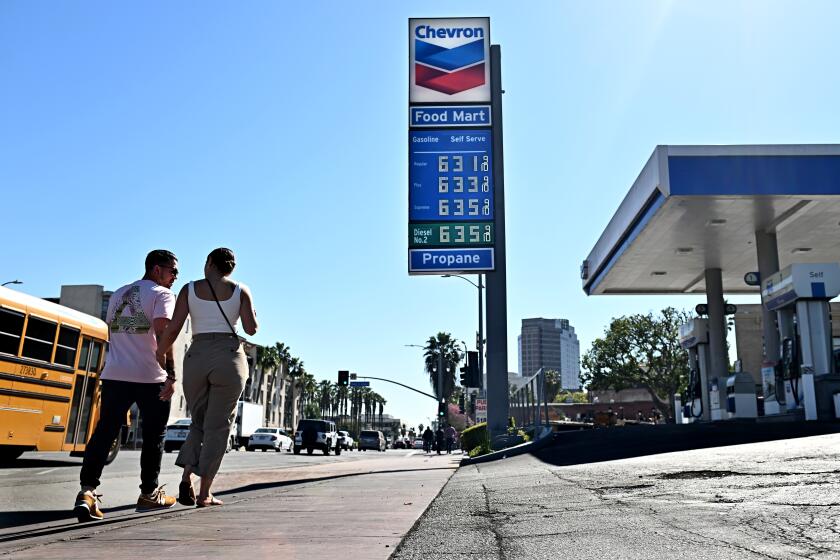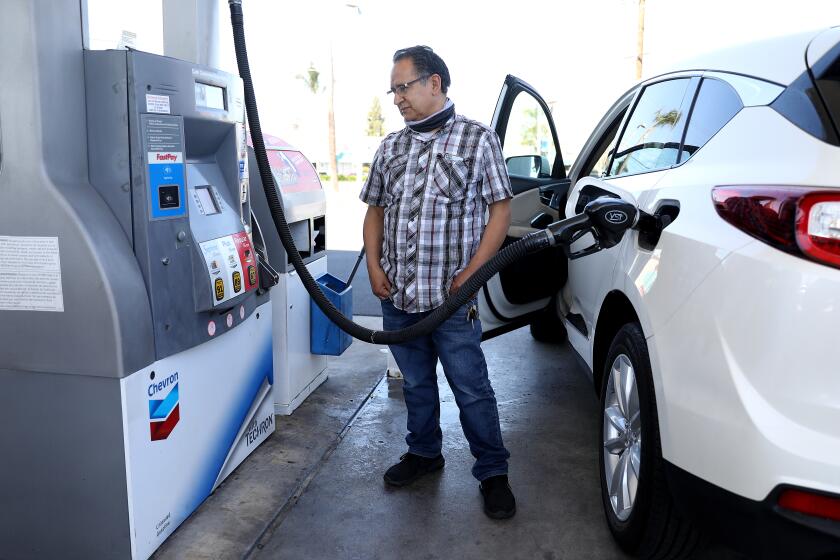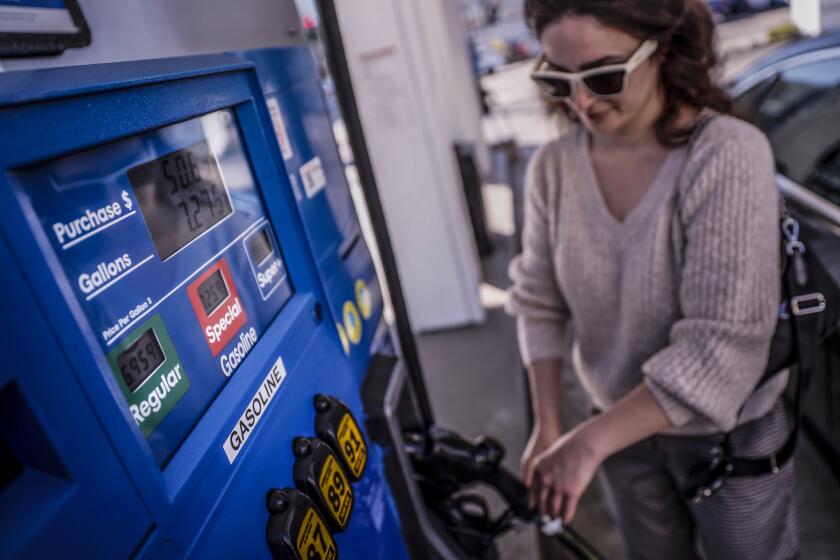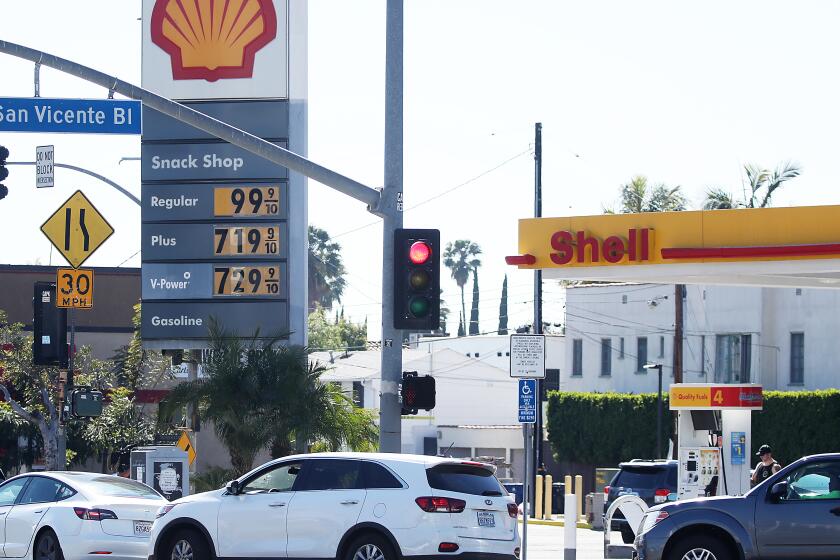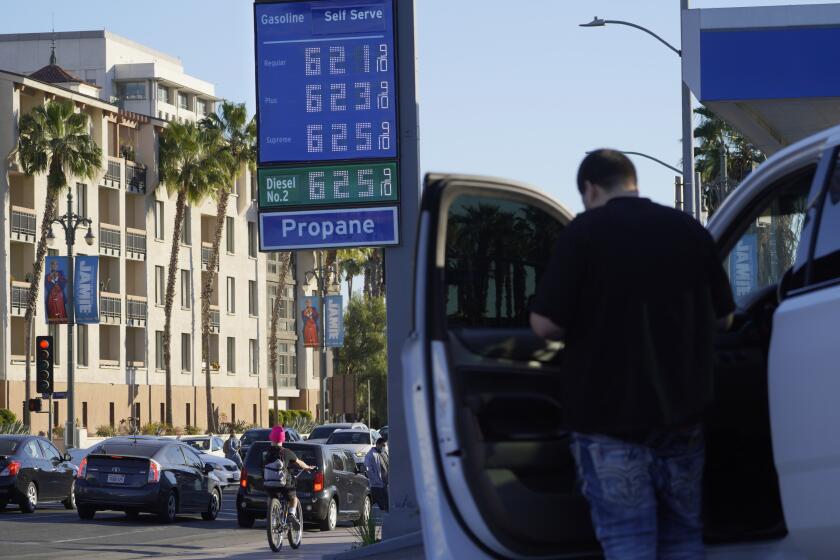The truth about L.A.’s most notoriously expensive gas stations
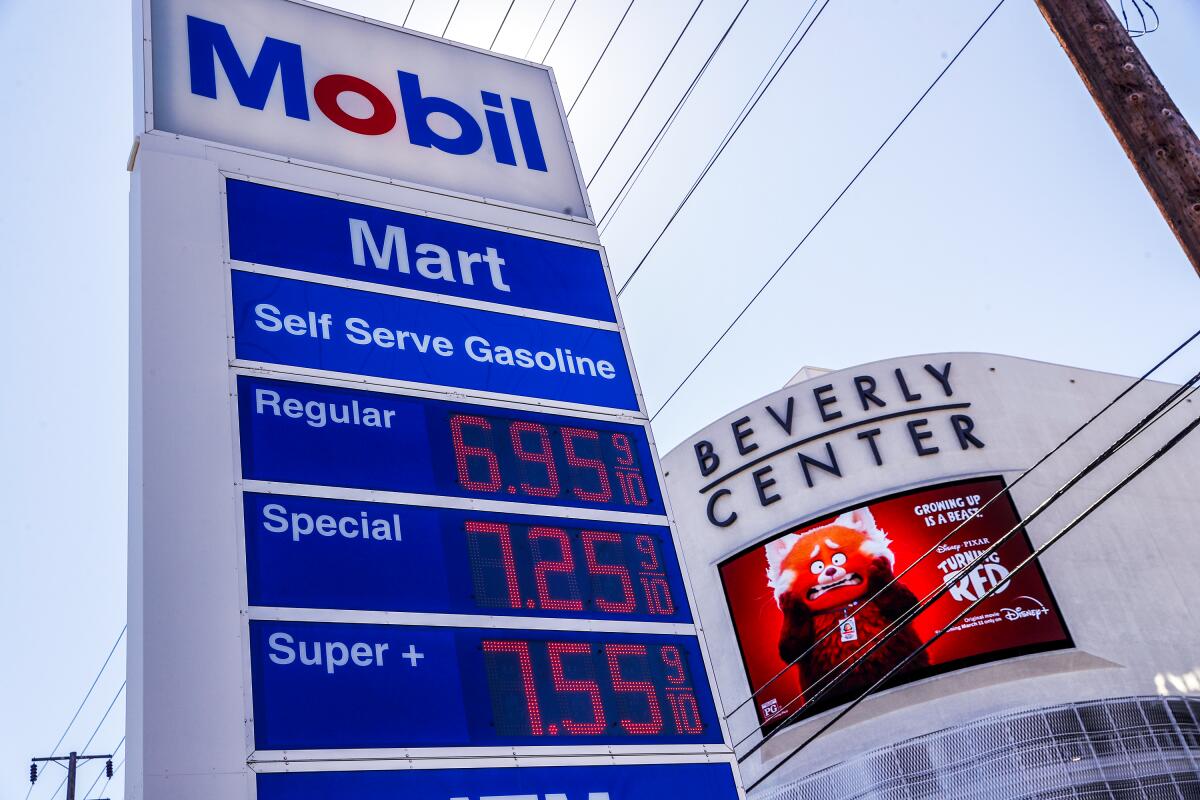
Gas prices in Los Angeles have climbed to new heights this week, with Angelenos shelling out more than $5.50 a gallon on average at the pump.
But for customers at a handful of notorious gas stations across town, $5.50 would be a bargain.
These stations are the mysterious outliers of the L.A. petroleum landscape, advertising $6.95, $6.99 or even $7.05 for a gallon of regular grade, seemingly in defiance of economic sense.
Mention their intersections, and many Angelenos gravely nod, their eyes growing wide: How can that place at Fairfax and San Vicente, or La Cienega and Beverly, or downtown on Alameda right across from Olvera Street, charge such wild prices? What dark secrets do they hide? And who’s desperate enough to buy gas there?
With a new federal ban on Russian oil nudging pump prices still higher, The Times set out to find answers at three of the priciest gas stations in town.
On a sunny Tuesday afternoon, the Mobil on La Cienega across from the Beverly Center had customers despite its $6.95 price ($7.55 for the many buying premium). Most were in a rush, a little lost or using a company card.
One man, Edvard Barreto, said he stopped by in his late-model Volvo SUV because he was on the way to pick up a friend at LAX and didn’t want to set out with less than a full tank.
Taylor Symone, who works as a nanny, was filling up her Mazda CX-5 before driving her young charge back home to West Hills after a nearby music lesson. “This was the first place close to me. I probably wouldn’t have gone here had I known how expensive it was,” Symone said.
Already-high gas prices are headed higher because of the Russia-Ukraine conflict, a painful blow for L.A.’s lower earners who must drive to survive.
Harwood and Ryan Lee said they were in the neighborhood to buy supplies for the costuming business that the couple run together — they do work for a number of TV shows, including “American Horror Story” — and were adding only a few gallons to the tank of their BMW M440i before heading home to Mt. Washington.
“I love my car. The gas prices are just ridiculous,” Harwood said, though working at home lessens the financial strain.
In addition to their TV and film work, the pair make costumes and outfits for celebrities — Elon Musk has been a costume client, and they helped put the finishing touches on the 2018 Met Gala outfit he designed for Grimes, the musician and Musk’s former partner. Harwood said they plan to trade the car in for the equivalent all-electric BMW when it becomes available in the U.S.
Mike, who declined to give his last name, pulled in to fill up the tank of a brand new V-12 Bentley Continental GT Speed. The total topped $128. The only reason he was using this gas station was because he wasn’t paying for it.
Gas prices are high across California, and it’s unclear when prices will go down. But, there are ways to save money on gas. Here are some tips.
“Because I’m on the clock and using a company card and I’m delivering to a client, I’m just using whatever’s closest,” he said, “but if I was using my own personal card, Costco’s the only way to go.”
Philip Daus, an energy market expert and managing partner at the pricing consulting firm Simon-Kucher & Partners, said that he had not heard of a local market having more than a $1 differential in prices within less than a mile. “That’s certainly unusual,” he said.
Price-conscious commuters and younger drivers who use apps to compare prices make up only one segment of the driving public, Daus said. People traveling to unfamiliar parts of town, driving sporadically or getting their expenses paid by their employers behave differently.
His research has also shown that American gas consumers are much less sensitive to price differences between gas stations than those in his native Germany, and high traffic congestion can drive anyone to choose the closest option rather than journey off into the unknown.
Q&A: How President Biden’s decision to halt U.S. purchases of Russian oil is likely to affect prices at the pump and beyond?
Pressed to hypothesize, Daus guessed that a combination of L.A. traffic, high-value locations, low-information drivers and wealthier consumers combined to create an opportunity for some stations to shoot for the moon on price. Still, speaking from his Houston office, he found the phenomenon puzzling. “My own parents would drive 10 kilometers if they learned about a gas station that was charging 2 cents less per liter,” Daus said.
High prices, low margins
At the Beverly Center station, in the span of an hour, a number of people drove in just to take a photo of the gas station’s sign showing the day’s prices. More people walked in to buy snacks at the station’s convenience store.
When reached at his office, the owner and operator of the gas station, Charles Khalil, said that there’s no economic mystery behind his prices: People shopping around the Beverly Center are just willing to pay.
He’s operated the location since 1990 and kept the prices above average since the beginning. “I always kept my pricing even, my profitability and everything even, 30 years to today, always the same,” Khalil said.
With land so valuable, his mortgage payments are high, he said, and after his franchise agreement expires in a few years he expects he’ll sell. “It doesn’t pay to be a gas station with the value of the land” in the middle of a shopping district.
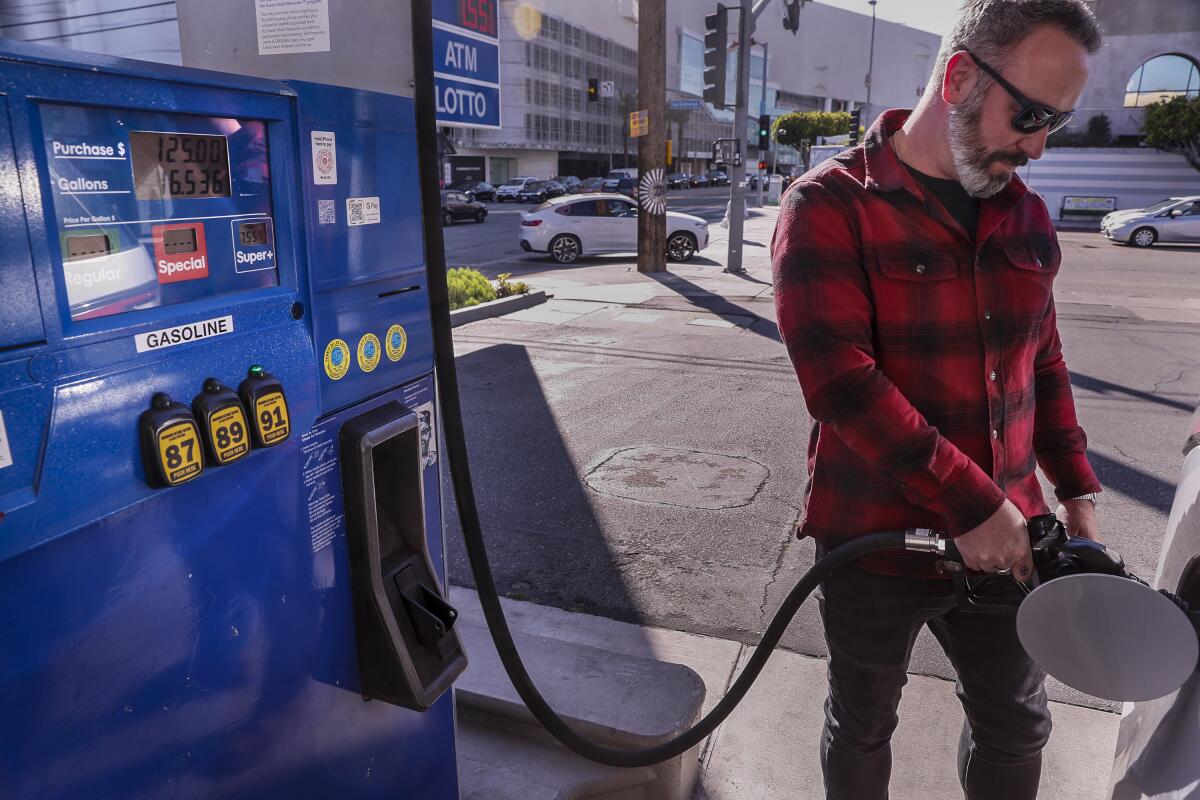
Khalil said that he has been in the gas station business for more than 50 years, having taken a job at a station soon after moving to the U.S. from Lebanon in the late 1960s. Today, he owns two — the La Cienega station and another at Westwood and Santa Monica — but his real business is running a national convenience store marketing consulting firm out of his office in Torrance. In that role, he negotiates with big companies such as Coca-Cola and Frito-Lay on behalf of independent stores to buy snacks and drinks at better prices.
But charging a premium for fuel has worked for Khalil, he says. “I have never had problems” moving gasoline, he said. He noted that he charged more typical gas prices in Westwood because the market there would not support the higher rates.
For most Americans, the most tangible impact of the war in Ukraine is the rising cost of gasoline.
The majority of his revenue comes from the convenience store, not gasoline sales; even at the prices he charges, he said, gas has a fairly low profit margin compared with snacks and drinks, once upkeep, labor costs and taxes are factored in. He said he holds on to his two locations in part to serve as test sites for his consulting firm, to better understand how new products play in the market.
“It’s a pretty good metropolitan location,” Khalil said, with a mix of upper-class shoppers and people who work at stores and restaurants nearby. “You have a combo of both worlds, and you can tell if a product is going to make it.”
Running on empty
“Because my car’s on E.”
That’s what Larry said while putting $10 into his SUV at the Chevron at 901 N. Alameda St., across from Olvera Street in downtown L.A., where a gallon of regular gas cost $7.05.
Like Larry, most of the people who stopped by the station didn’t fill their tank up all the way, instead putting $10 on pump 5, $20 on pump 3 or $13 on pump 1.
Larry, who declined to give his last name, said it was the only station he knew that was close by and said he normally wouldn’t stop there unless he was desperate. “I know other gas stations, but they’re out of the area,” he said.
Staffers at the station said they could not speak to the media, but public records show that the owner is Hawk II Environmental Corp., run by a Whittier man named Joe Bezerra Jr. He did not respond to multiple requests for comment.
Shortly after Larry’s stop, Sal Morales pulled into the Chevron with his moving truck for the same reason: He was running out of gas and picked the first station he saw.
Morales said his company pays for his gas, although he’d have to limit himself because of the exorbitant prices. “My max is only $150, so I’ll probably just get like half a tank,” he said.
Gasoline prices are still below their historical peak, adjusted for inflation, but no one can say how high they’ll go.
On his own dime, Morales is more judicious about where he fills his car. He said he prefers Arco or Costco because their prices are typically cheaper, and he occasionally uses apps such as GasBuddy to find the cheapest price per gallon.
“Even filling my own car costs a lot more than usual,” he said. “If I’m in a certain area, I’ll try to find the cheapest station, but if not, I gotta do what I gotta do.”
Finding a customer at the station where Fairfax, Olympic and San Vicente meet proved more difficult. The Shell station often has the highest prices in the entire metro area, and according to public records is operated by Sinaco Oil, a company that owns a number of other gas stations, including one at National and Sawtelle. The owners of Sinaco Oil did not respond to requests for comment.
Over the course of an hour, more people used the station as a cut-through to skip a long light than to gas up for $6.99 a gallon. Three TV news camera crews stopped by to shoot B-roll footage of the station’s sign.
Donnell Garcia, in a Honda Civic, pulled up to a pump but didn’t reach for a nozzle. He just had to use the bathroom, he said. “This place is ridiculous.”
A man in a Toyota Tacoma TRD got a few gallons and started driving away. While waiting to enter traffic, he yelled from his window, “These prices are crazy!” But he didn’t have time to go off his route to get cheaper gas.
One commuter did come in for a standard fill-up. Brooklyn Barrett said she was driving back home to downtown after finishing her shift at the Alfred Tea Room near Melrose Place.
The gas light in her Honda CR-V had just turned on. “I didn’t see the price when I pulled up, but I also didn’t want to run out of gas,” she said, noting that the price of a gallon was “half of my hourly wage.”
She said life in L.A. had only been OK since she moved here last year. “It’s not where I want to be exactly,” she said, “especially with gas being where it is — and I’m poor.”
“How much more expensive is this than places nearby?” she asked. When informed of the nearly $1.50 price differential, she sighed. “Of course I stop at this one.”
Times staff writer Kenan Draughorne contributed to this report.
More to Read
Inside the business of entertainment
The Wide Shot brings you news, analysis and insights on everything from streaming wars to production — and what it all means for the future.
You may occasionally receive promotional content from the Los Angeles Times.
